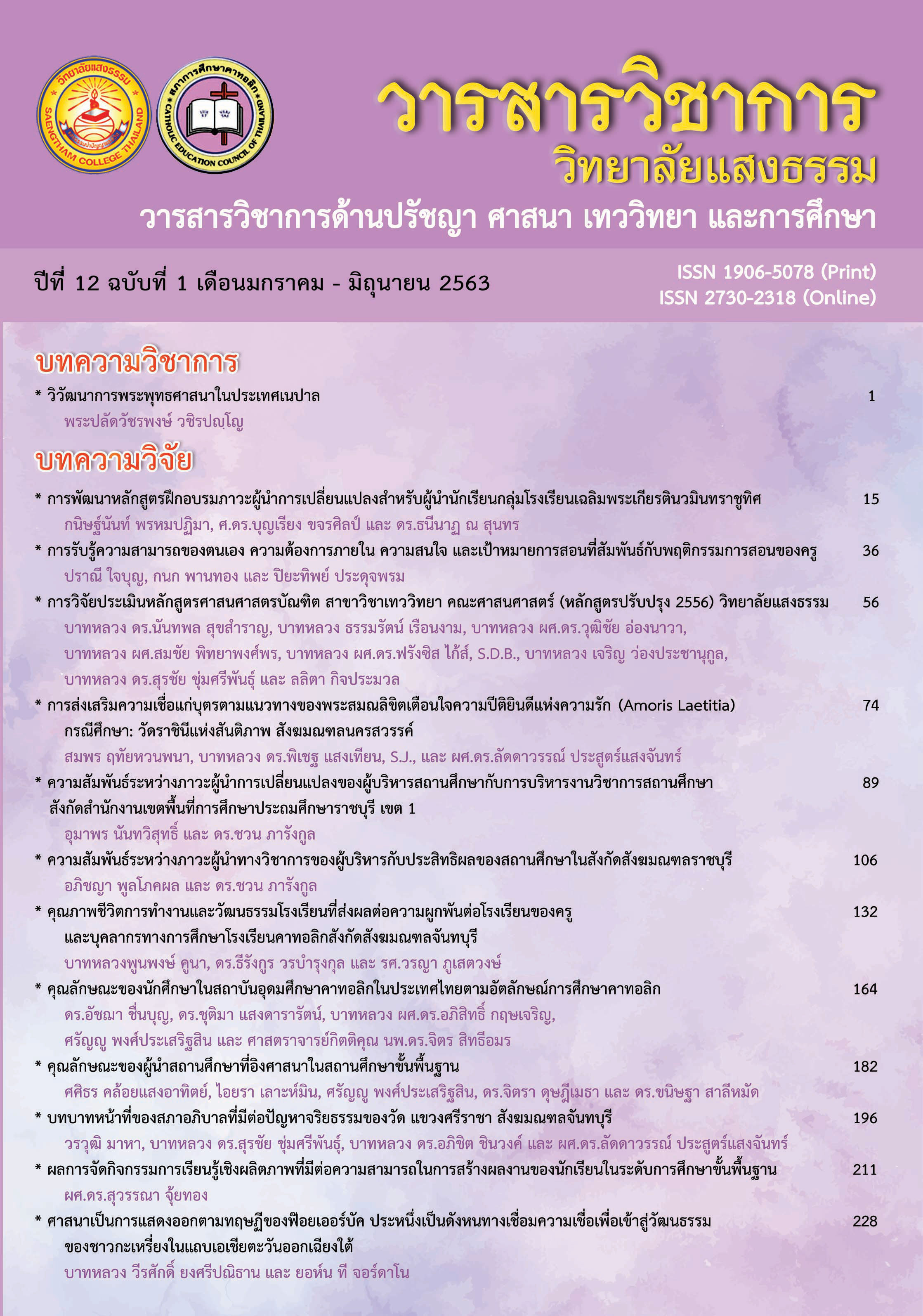The Effect of Quality of Work Life and School Culture on The Commitment of Teachers and Educational Personnel in Catholic Schools Under The Education Section of Chanthaburi Diocese.
Main Article Content
Abstract
The purposes of this research were to study 1) the quality of work life, school culture and the commitment of teachers and educational personnel in catholic schools under the education section of Chanthaburi diocese, 2) the relation between quality of work life with the commitment of teachers and educational personnel and the relation between school culture with the commitment of teachers and educational personnel in catholic schools under the education section of Chanthaburi diocese, and 3) the regression equation of quality of work life and school culture affecting the commitment of teachers and educational personnel in catholic schools under the education section of Chanthaburi diocese. The samples consisted of 309 teachers and educational personnel in catholic schools under the education section of Chanthaburi diocese in academic year of 2017. The research instrument was a five – rating scale questionnaire containing 113 items with IOC validity level of 0.66-1.00, the discrimination level of 0.21-0.81. The questionnaire itself showed the reliability level of 0.97. The descriptive statistics were percentage, mean (x̅), standard deviation (S.D.), the Pearson Product Moment Correlation (rxy), and Multiple Regression Analysis The results of the study were as follows: 1) the quality of work life, School culture and the commitment of teachers and educational personnel in catholic schools under the education section of Chanthaburi diocese were at highest levels. 2) The relation between quality of work life and school culture with the commitment of teachers and educational personnel were positively and relatively correlated, showing the statistical significance at the .01 level and the relation between school culture with the commitment of teachers and educational personnel in catholic schools under the education section of Chanthaburi diocese were positively and relatively correlated, showing the statistical significance at the .01 level. 3) The regression equation of the quality of work life and school culture affecting the commitment of teachers and educational personnel in catholic schools under the education section of Chanthaburi diocese showed the aspects of acceptance of sense of community (XS4), caring (XS8), integrity (XS9) and the security and professional growth (XQ3) with the multiple correlation co-efficient level of 0.84, The result could show the 71 percent of the prediction power towards the commitment of teachers and educational personnel in catholic schools under the education section of Chanthaburi diocese. There was statistically significant relation at .01 level and the result could create prediction equation of regression equation as follows: raw score prediction equation result of Ŷ= 0.37+0.35XS4+0.22XS8+0.24XS9+0.10XQ3 and standard scores prediction equation result of Ζ=0.36XS4+0.25XS8+0.24XS9+0.12XQ3
create prediction equation of regression equation as follows: raw score prediction equation result of Ŷ= 0.37+0.35XS4+0.22XS8+0.24XS9+0.10XQ3 and standard scores prediction equation result of Ζ=0.36XS4+ 0.25XS8+0.24XS9+0.12XQ3
Article Details
- The academic and research articles, as well as the content and opinions expressed therein, published in Saengtham College Journal are solely the responsibility of the respective author(s).
- Articles published in Saengtham College Journal are the property of Saengtham College. Reproduction, modification, or dissemination of all or part of the content in any form without written permission from Saengtham College is prohibited.
- Articles published in Saengtham College Journal are protected under the Copyright Act.
References
กรมพัฒนาฝีมือแรงงาน กระทรวงแรงงาน. (2553). “เส้นทางความก้าวหน้าในอาชีพของข้าราชการสายงานนักวิชาการพัฒนาฝีมือกระทรวงศึกษาธิการ” ใน พระราชบัญญัติโรงเรียนเอกชน พ.ศ.2550 แก้ไขเพิ่มเติม (ฉบับที่ 2). หน้า 7-8. กรุงเทพฯ: กรมพัฒนาฝีมือแรงงาน.
จอมพงศ์ มงคลวนิช. (2556). การบริหารองค์การและบุคลากรทางการศึกษา. พิมพ์ครั้งที่ 2. กรุงเทพฯ: จุฬาลงกรณ์มหาวิทยาลัย.
ชุติมา เผ่าพหล. (2553). คุณภาพชีวิตการทำงานและระดับความผูกพันต่อองค์การของพนักงานธนาคารกรุงเทพ จำกัด มหาชน. การศึกษาค้นคว้าอิสระ บธ.ม. (บริหารธุรกิจ). กรุงเทพฯ: บัณฑิตวิทยาลัย มหาวิทยาลัยเกษตรศาสตร์.
ณัฎฐพันธ์ เขจรนันทน์. (2551). พฤติกรรมองค์การ (Organizational Behaviors). กรุงเทพฯ: ซีเอ็ดยูเคชั่น.
นิติพล ภูตะโชติ. (2559). พฤติกรรมองค์การ (Organizational Behavior). พิมพ์ครั้งที่ 3. กรุงเทพฯ: จุฬาลงกรณ์มหาวิทยาลัย.
ประเวศน์ มหารัตน์สกุล. (2558). การจัดการทรัพยากรมนุษย์: แนวทางใหม่ (Human Resource Management: A New Approach). กรุงเทพฯ: ปัญญาชน.
ปรีชา วงษาบุตร. (2553). คุณภาพชีวิตการทำงานกับความผูกพันต่อองค์การของพนักงาน บริษัท คาร์เปท อินเตอร์แนชั่นแนล ไทยแลนด์ จำกัด (มหาชน). การศึกษาค้นคว้าอิสระ บธ.ม. (บริหารธุรกิจ). กรุงเทพฯ: บัณฑิตวิทยาลัย มหาวิทยาลัยเกษตรศาสตร์.
ปวีณา กรุงพลี. (2552). ความสัมพันธ์ระหว่างคุณภาพชีวิตการทำงานกับความผูกพันต่อองค์กรของเจ้าหน้าที่สำนักกษาปณ์. วิทยานิพนธ์ บธ.ม. (บริหารธุรกิจ). ปทุมธานี: บัณฑิตวิทยาลัย มหาวิทยาลัยราชภัฎวไลยอลงกรณ์ในพระบรมราชูปถัมภ์.
พนิดา คำกิ่ง. (2558). ความสัมพันธ์ระหว่างการรับรู้วัฒนธรรมองค์การกับความผูกพันต่อองค์การของพนักงานโรงพยาบาลการุณเวช จังหวัดปทุมธานีและจังหวัดพระนครศรีอยุธยา. การศึกษาค้นคว้าอิสระ บธ.ม. (การบริหารธุรกิจ). ปทุมธานี: บัณฑิตวิทยาลัย มหาวิทยาลัยราชภัฎวไลยอลงกรณ์.
พิบูล ทีปะปาล (2551). การจัดการเชิงกลยุทธิ์ (Strategic Management). กรุงเทพฯ: อมรการพิมพ์.
มนชญา ดุลยากร. (2553). การศึกษาวัฒนธรรมโรงเรียนที่มีอิทธิผลต่อความผูกพันของครูต่างชาติในโรงเรียนนานาชาติ. วิทยานิพนธ์ ศศ.ม. (ภาษาและวัฒนธรรมเพื่อการสื่อสารและการพัฒนา). นครปฐม: บัณฑิตวิทยาลัย มหาวิทยาลัยมหิดล.
รุ่งโรจน์ อรรถานิทธิ์. (2554). การสร้างความผูกพันของพนักงานในองค์กร (Employee Engagement). กรุงเทพฯ: บ้านหนังสือโกสินทร์.
ลัดดา ดวงรัตน์. (2552). ผลกระทบของวัฒนธรรมองค์กรและคุณภาพชีวิตในการทำงานที่มีผลต่อความผูกพันในองค์กรของผู้สอบบัญชีสหกรณ์ในสำนักงานตรวจบัญชีสหกรณ์. วิทยานิพนธ์ บช.ม. (การบัญชี). มหาสารคาม: บัณฑิตวิทยาลัย มหาวิทยาลัยมหาสารคาม.
สภาการศึกษาคาทอลิกแห่งประเทศไทย. (2556). อัตลักษณ์การศึกษาคาทอลิก (ฉบับปรับปรุง ค.ศ.2013). กรุงเทพฯ: สภาการศึกษาคาทอลิกแห่งประเทศไทย.
สภาการศึกษาคาทอลิกแห่งประเทศไทย. (2557). ก้าวไปข้างหน้าด้วยอัตลักษณ์การศึกษาคาทอลิก ปี ค.ศ.2012-2015. กรุงเทพฯ: สภาการศึกษาคาทอลิกแห่งประเทศไทย.
สำนักงานกองทุนสนับสนุนการสร้างเสริมสุขภาพ. (2552). เมล็ดพันธุ์แห่งความสุขแผนกงานสุขภาวะองค์กรภาคเอกชน. นครปฐม: มหาวิทยาลัยมหิดล.
สำนักงานคณะกรรมการข้าราชการพลเรือน. (2550). การเสริมสร้างคุณภาพชีวิตและการทำงานกระแสใหม่ของการบริหารทรัพยากรบุคคล. กรุงเทพฯ: แอร์บอร์นพรินต์.
สิทธิชัย นันทนาวิจิตร. (พฤษภาคม–มิถุนายน 2551). “การสร้างวัฒนธรรมองค์การสู่ความเป็นเลิศ,” วารสาร Productivity World เพื่อการเพิ่มผลผลิต. 13(74), 20.
สุดารัตน์ ครุฑสึก. (2557). ปัจจัยคุณภาพชีวิตในการทำงานของพนักงานความผูกพันต่อองค์กรและการสื่อสารในองค์กรส่งผลต่อการเป็นสมาชิกที่ดีต่อองค์กรของพนักงานเอกชนในเขตกรุงเทพมหานคร. การศึกษาค้นคว้าอิสระ บธ.ม.(บริหารธุรกิจ). กรุงเทพฯ: บัณฑิตวิทยาลัย มหาวิทยาลัยกรุงเทพ.
สุพจน์ นาคสวัสดิ์. (2559). การสำรวจความผูกพันในการทำงานของพนักงาน (Employee Engagement Survey). กรุงเทพฯ: เอช อาร์ เซ็นเตอร์.
Alderfer, C.P. (1972). Existence, Relatedness, and Growth; Human Needs in Organizational Settings. New York: Free Press.
Allen, N.J. and Meyer, J.P. (1990). “The Measurement and Antecedents of Affective Continuance and Normative Commitment of the Organizations,” Journal of Occupational Psychology, 63, 1-18.
Beare, H. and et al. (1989). Creating an Excellent School: Some New Management Techniques. London: Rutledge.
Buchanan, B. (December 1974). “Building Organizational Commitment: The Socialization of Managers in Work Organization,” Administrative Science Quarterly, 19(4), 533-546.
George, J.M. and Jones, G.R. (2004). Understanding and Managing Organizational Behavior. Tanas: Addison-Wesley.
Hanson, E.M. (1991). Educational Administration and Organizational Behavior. Boston, MA: Allyn and Bacon.
Lussier, R.N. (2001). Leadership : Theory, Application and Skill Development. Ohio: South-Western College.
Luthans, F. (1995). Organization Behavior. 7th ed. New York: McGraw-Hill.
Maslow, A.H. (1970). Motivation and Personality. New York: Haper and Brother.
Porter, L.W. and et al. (December 1974). “Organizational Commitment Job Satisfaction and Turnover among Psychiatric Technicians,” Journal of Applied Psychology, 59(5), 603-609.
Rutebuka, A.K. (2000). “Job satisfaction among Teacher in Seventy – day Adventist School and its Relationship to Commitment and Selected Work Conditions,” Journal of Research on Christian Education, 9, 257-289.
Sergiovanni, T.J. and Strarratt, R.J. (1988). Supervision Human Perspectives. 4th ed. New York: McGraw-hill.
Steers, R.M. (1977). Organizational Effectiveness : A Behavioral View. California: Goodyear.
Wiles, K. (1953). Supervision for Better School: The Role of the Official Leader in Program Development. 6th ed. Englewood Cliffs, NJ: Prentice-Hall.
Yamane, T. (1973). Statistic: An Introductory Analysis. 3rd ed. New York: Harper and Row.


